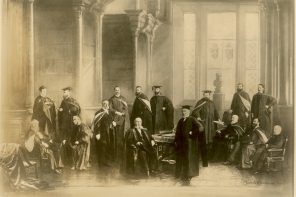Honour.
Take another look at that word. Honour.
Honour is a perplexing word to our generation. We learned in class that it was the foundation of medieval Europe, feudal Japan, the nation-state—in fact, honour was omnipresent throughout history. But today, honour feels distant—irrelevant—like a relic of the past. Why?
For a term so deeply rooted in anthropology, it is curious that the discipline of economics would have anything to say on the subject. In fact, the two are uniquely intertwined.
Consider this: we largely see the demise of honour in societies the same time we see the rise of capitalism in the 17th and 18th centuries, a period also considered the birth of modern economics.
In the place of honour, we instead see the widespread—really widespread—pursuit of profit, gain and consumption. Societal norms are upended by capitalism. And in the footsteps of this cultural juggernaut, economics has followed, justifying its existence, its mechanics, its perfection.
Economics did not stop there, however. While it directed our future, it too rewrote our past.
It is no coincidence we intuitively believe markets are naturally self-creating, money existent since the dawn of time and people inherently self-interested. In reality, this could not be further from the truth. In his provocative 2011 book, “Debt: The First 5,000 Years,” anthropologist David Graeber explores this deep-rooted mythology and challenges the orthodox economic thought.
One by one, he reveals that the theory simply does not hold up against the facts.
While most of us believe that markets are self-creating, we do not know why or why not. We simply accept it as true—a given. If pressed, we might argue that since people want goods they do not have, they trade, and since they want to maximize their consumption, buyers seek the lowest price and sellers the highest. In their mutual search for the optimal price, there emerges an equilibrium—that is, the basis of markets.
But, this presumes that people have always wanted to maximize their consumption. History shows this is not the case. In honour cultures, status, community and piety were all valued greater than consumption or the mere accumulation of wealth. Unlike today, where we have the luxury of meeting new people daily, most locals would never venture beyond the borders of their village. As a result, reputation defined individuals within the community. If one violated another’s trust, he could be publicly shamed and expelled, or even killed. What therefore existed then was an incredibly powerful disincentive toward risking one’s reputation. If one valued his reputation over all other things, he would go out of his way to make sure he helps others, gives freely and appears selfless. And, overwhelmingly, this is exactly what the evidence shows: local villages were dominated not by markets, but by gift giving and rudimentary systems of credit.
Graeber also challenges the traditional history of money. As our introductory economics textbooks tell us: first came barter, then money, and sometime after followed credit. Back in the old days, barter required a “double coincidence of wants:” people who wanted to trade must be in the same place, at the same time, with reciprocal wants. If I want your sheep, you better want my two shirts, otherwise we cannot trade. Money arose to solve this dilemma: one could trade for money, and then exchange that money for a desired good. Eventually, as physical money became too unwieldy, credit emerged to facilitate transactions.
The problem with this convincing tale is that none of it is true. Barter only occurred between strangers—often lone travelers or nomadic tribes—where both parties were reasonably sure they would never see the other again. Within communities, however, barter was viewed as disrespectful and, moreover, was extremely rare. Instead, villages operated on credit and gifts. When an individual needed a kettle, the blacksmith gave him a kettle. If the kettle required a lot of work, the individual simply recognized he owed something in return, sometime in the future—maybe a beaded necklace, maybe a few woolen shirts. Notably, most debts were not even recorded, but retained only in memory. Literacy was rare and double-entry accounting did not exist. This partially explains why historians find it so difficult to find accurate numerical data from the past—people cared less for numbers than they did for relationships, motives and intentions. A very informal system of credits therefore prevailed within local communities, coexisting with gifting and physical money. To preach a linear history of money, however, is at best overly simplistic, and at worst patently false.
Finally, Graeber contests one last intuition: that people are naturally self-interested, seeking to profit whenever the opportunity arises. While we may be maximizers of our own well-being, this does not necessarily imply that we are maximizers of wealth and consumption. Other factors, among which probably most important is social status, play a vital role in our decision-making processes. Why do you offer to pay for lunch even if a person with higher status, such as a professor or industry professional, makes more money than you? Why do you not tally who owes what with siblings, and why parents give freely to their children? Here is a hint: it is not that we are “irrational,” but rather that we consider a multitude of factors beyond simply our wealth and consumption. Without a doubt, our ancestors cared about money—just, a lot less than we do. Not every decision for them required careful monetary cost-benefit analysis, but moreso answering a simple question: what will people think of me?
Let me conclude with this final point: economics works. For our society, values, technology and population, our patterns of consumption operate as an extremely accurate proxy for explaining our behaviour—this is the foundation of economics.
But, we must equally recognize that if the world were different, as it was hundreds and thousands of years ago, economics may not work. Perhaps a world before capitalism cannot be described by economic models, but only understood in a larger social, political and religious context. Because economics without capitalism is like geology without rocks—it simply does not make sense.
Is it not peculiar we see “economic growth,” in terms of output per worker, skyrocket with England’s 18th century Industrial Revolution from a near flatline for all of history before? Or, that we base our economic models on an input—capital—which nearly by definition did not exist before capitalism? The circularity of this ideological defense underscores a sobering truth: economics was born to justify not only capitalist society we live in, but the capitalist mentality we live by.
Could it be that before capitalism, people cared less about output and growth, and more about what directly affected them, like their family and God? Could it be that people only started caring about these quantifiable measures once economics quantified them and said they should care? And could it be that our single-minded focus on economic growth has come at the cost of what economics didn’t tell us to maximize—our piety, equality, and selflessness?
We must therefore be wary to explain the workings of the past with the mechanics of the present because the past is fundamentally different from the present. Just as we value our wealth today, our ancestors valued their godliness and reputation, and perhaps our own descendants will only value their knowledge. Belief systems evolve, religions surge and fade, empires rise and fall, and honour—it has come and gone.







